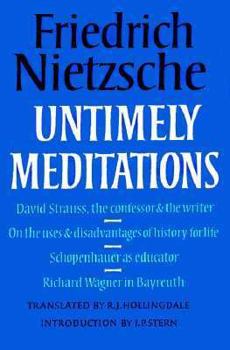Untimely Meditations
(Book #2 in the The Complete Works of Friedrich Nietzsche Series)
Select Format
Select Condition 
Book Overview
Customer Reviews
Rated 5 starsThe Transvaluation of All begins here:
The timeliness of these essays belies the political radicalism they express. Taken with his later works, especially Beyond Good and Evil and the Genealogy of Morals, one catches the man with his ideological 'pants-down'. --These essays contain in clearest definition, his project of revaluation, and there is no better 'clarification' of what George Brandes named "aristocratic radicalism" than as it appears here, standing...
0Report
Rated 5 starsBest place to start
I consider Nietzsche to be the most honest, profound and relevant thinker available to those who are lost and nauseated in a godless, overly- democratised world. This is not to say that Nietzsche is without faults, and serious ones at that. Nevertheless, at his best he combines an honesty, seriousness and profoundity that are, in my view, unsurpassed. With this in mind I would recommend to anyone who wishes to undertake a...
1Report
Rated 5 starsNietzsche's Meditations on Culture
These four "Meditations" deal with, as has been noted in other reviews, a very diverse number of topics. Primarily, however (and apart from the scattered passages of philosophical interest), they are criticisms, or more accurately explanations, of culture. Although they deal with issues such as sholarship, literature, science, art, and of course philosophy, the recurring theme in all four is culture. What it is, what kind...
0Report
Rated 5 starsUnfashionable Observations
Nietzsche wrote "David Strauss, the Confessor and the Writer" in 1873, the first of his Unfashionable Observations, at the behest of Richard Wagner. David Strauss was an eminent theologian, whose The Life of Jesus Critically Examined (1864) had had a tremendous impact due to its demystification of Jesus' life. Strauss had contended that the supernatural claims made about the historical Jesus could be explained in terms of...
0Report
Rated 5 starsFrom the acorn . . .
Herein lie the seeds of Nieztsche's notion of Eternal Recurrence, which will germinate in The Gay Science, and bear fruit in Zarathustra. Neitzsche's treatment of the four "types" of history in "On the Uses and Disadvantages of History for Life" is facsinating, both in its own right, and as a prelude to the notion of eternal recurrence.This is really a book that must be read by anyone serioulsly interested in Nietzsche's...
0Report














